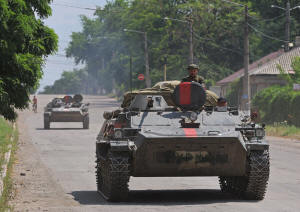Dozens of Ukrainian prisoners of war believed killed in missile strike
 Send a link to a friend
Send a link to a friend
 [July 29, 2022]
By Natalia Zinets [July 29, 2022]
By Natalia Zinets
KYIV (Reuters) -Dozens of Ukrainian
prisoners of war appear to have been killed in an missile strike on
Friday, with Moscow and Kyiv accusing each other of carrying out the
attack.
The incident overshadowed U.N.-backed efforts to restart grain shipments
from Ukraine and ease a looming global hunger crisis stemming from the
war, now in its sixth month.
Russia's defence ministry said 40 prisoners were killed and 75 wounded
in the attack on the prison in the frontline town of Olenivka, in a part
of Donetsk province held by separatists.
It accused Kyiv of targeting it with U.S.-made HIMARS rockets, Russian
news agencies reported.
Ukraine's armed forces denied carrying out strike and blamed it on
Russian forces, saying Russian artillery had targeted the prison.
"In this way, the Russian occupiers pursued their criminal goals - to
accuse Ukraine of committing 'war crimes', as well as to hide the
torture of prisoners and executions," the general staff of the Ukrainian
Armed Forces said.
The Russian defence ministry said the prison housed Ukrainian prisoners
of war and that eight prison staff were also wounded. Russian-backed
separatist leader Denis Pushilin was quoted as saying there were no
foreigners among 193 people held there.

Video released by a Russian war correspondent showed Russian-backed
military personnel sifting through the burned-out remains of what he
said was the prison.
The smashed roof of the building was hanging down and the charred
remains of bodies could be seen.
Separately Ukraine said at least five people had been killed and seven
wounded in a Russian missile strike on the southeastern city of Mykolaiv,
a river port just off the Black Sea, as Russia fired across frontlines
in eastern and southern Ukraine.
A missile struck near a public transport stop, regional governor Vitaly
Kim said on Telegram.
Russia, which denies targeting civilians, did not immediately comment on
the situation and Reuters could not verify the battlefield reports.
GRAIN HOPES
Russia and Ukraine agreed last week to unblock grain exports from Black
Sea ports, which have been threatened by Russian attacks since it
invaded Ukraine on Feb. 24.
The deal was the first diplomatic breakthrough of the conflict and wheat
prices being offered in Asia slid this week on expectations of higher
supplies.
But fierce fighting makes it extremely risky.
United Nations aid chief Martin Griffiths said on Thursday evening he
hoped the first grain would move on Friday but that crucial details for
the safe passage of vessels were still being worked out.
[to top of second column]
|

Service members of pro-Russian troops ride an infantry fighting
vehicle during Ukraine-Russia conflict in the city of Lysychansk in
the Luhansk Region, Ukraine July 4, 2022. REUTERS/Alexander
Ermochenko

He emphasised that the operation was commercial - not humanitarian -
but he said the United Nations hoped poorer countries would get
priority, citing Somalia, where nearly a quarter of a million people
face starvation.
While the blockage of grain in Ukraine, one of world's biggest
exporters, has fed into food price rises around the world, shortages
of Russian gas have raised energy prices in Europe and prompted
fears of shortages over winter.
Russian gas flows via the Nord Stream 1 pipeline to Germany remained
at just 20% of capacity on Friday, after Russia halved the flows on
Wednesday citing maintenance work.
Moscow, which describes its invasion of Ukraine as a "special
military operation" conducted in self-defence, blames Western
sanctions for the low gas supplies. Ukraine and its allies say the
Russian assault was entirely unprovoked.
FOCUS ON SOUTH
An intelligence update from Britain said Russia has ordered
mercenaries to hold sections of the frontline in Ukraine - a sign it
is running short of combat infantry as Kyiv steps up a
counter-offensive in the south.
Greater reliance on fighters from the Russian private military
company Wagner Group for frontline duties rather than their usual
work in special operations would be another sign that Russia's
military is under stress six months into its war in Ukraine.
But the British defence ministry said in the update that Wagner
mercenaries were unlikely to make up for the loss of regular
infantry units or alter the trajectory of Russia's invasion.
"This is a significant change from the previous employment of the
group since 2015, when it typically undertook missions distinct from
overt, large-scale regular Russian military activity," the ministry
said.
Wagner and the Kremlin were not immediately available for comment.
Officials in Kyiv said on Wednesday they had observed a "massive
redeployment" of Russian forces to the south where British defence
officials believe Russia's 49th Army, stationed on the west bank of
the Dnipro River, is vulnerable.

Ukraine's counter-attacks in the south come as Russia battles for
control of the entirety of the industrialised Donbas region in the
east, comprising the provinces of Donetsk and Luhansk.
(Reporting by Reuters bureaux; Writing by Stephen Coates and
Philippa Fletcher; Editing by Lincoln Feast and Angus MacSwan)
[© 2022 Thomson Reuters. All rights
reserved.]
This material may not be published,
broadcast, rewritten or redistributed.
Thompson Reuters is solely responsible for this content. |